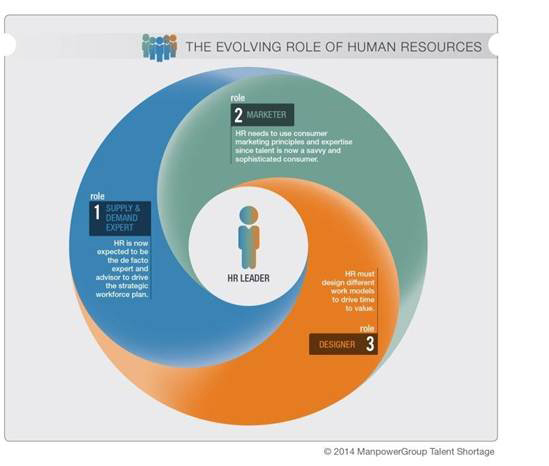- More than one in five global employers are missing out on talent because they are not pursuing strategies to address skills shortages
- The remit of HR leaders is rapidly expanding
- HR departments must take on new roles to attract and retain talent
ManpowerGroup’s Annual Talent Shortage Survey reveals that HR departments must adapt their people practices in order to fill increasing talent shortages, with 36% of employers globally reporting a difficulty in filling jobs due to the lack of skills available — the highest level for seven years.
ManpowerGroup spoke to over 37,000 employers in 42 countries and territories to assess the level of talent shortage and which jobs are proving most challenging to fill. While, globally more than one in three employers reports difficulty in filling jobs, in the UK the percentage of employers reporting a skills shortage has reduced to 12% in 2014. However, there is still work to be done.
One key finding of this year’s Talent Shortage Survey is that the HR profession is rapidly changing and expanding to encompass new areas of expertise that go far beyond the HR professional’s traditional remit. ManpowerGroup has identified three distinct roles HR departments must play to help organisations succeed:
1. HR must be Supply and Demand Experts
HR practitioners have always been aware of supply and demand issues, however they are now expected to be experts with an understanding of how demand for their companies’ products and services requires the right balance of skilled talent to meet changing needs and achieve business goals.
HR leaders need to provide market intelligence supported by relevant data, and understand how their internal and external talent supply is reshaping the availability of required skills. They must be able to spot any misalignment between business objectives and workforce capabilities and have a plan in place to bridge any gaps, and bridge them more quickly than in the past.
2. HR must be Marketers
In a world of talent shortages, HR’s role has expanded to include attracting and retaining talent in the same way that marketing segments and targets consumers of the company’s products and services. HR needs to consider how branding, messaging and image can help pinpoint and market their strengths to win in-demand skills and help their businesses succeed.
However, the process of thinking as marketers can’t stop after a company successfully has talent through the door. Organisations must ensure that they are offering career paths that allow employees to advance business goals, develop their skills and grow. This includes empowering leaders throughout the organisation to focus on, and be held accountable for, employee development, so that top talent stays motivated and engaged.
HR departments must regularly seek out quantitative and actionable employee feedback to ensure that improvement is an ongoing process and act quickly to address any misalignment.
3. HR must take the role of Designers
HR leaders must also act as designers, structuring work models to access, mobilise and unleash the potential of current and prospective employees in a diverse, and often virtual, workplace. This expanded role includes structuring work innovatively, and building systems to put an appropriate model in place to drive desired outcomes and develop the right balance of talent.
Work will be divided into smaller and smaller tasks distributed to more people as increasing segmentation is demanded. Work will also be performed more frequently by freelancers and consultants willing to work on an outcome basis so that they can choose the work they want to do. A different way of thinking is needed to cultivate communities of work, and balance the employment mix to include contingent, fully outsourced, partially retired and other workers—as permanent, fulltime employment is no longer by default the best fit for employers or individuals.

Mark Cahill, ManpowerGroup UK Managing Director, comments:
“At ManpowerGroup we believe that HR departments can hold the key to unlocking the talent shortage that so many companies are experiencing. The ones that are really getting it right understand that they must expand their remit beyond what is traditionally thought of as ‘HR’s role’ and develop expertise in whole new areas. Successful HR leaders are increasingly efficient in recruiting talent exactly where it is needed, marketing their organisation’s strengths to attract the best candidates and shaping the work model to suit their goals and employees.”



